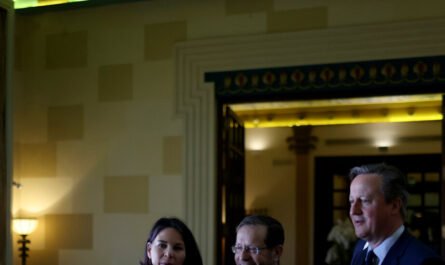The world’s biggest election begins
Voting begins today in a multistage election in India in which hundreds of millions of people will cast ballots. The election will determine whether their country’s powerful prime minister, Narendra Modi, will stay in office for a third term.
The vote is seen as a referendum on Modi’s economic record and his increasingly centralized and Hindu-first vision of India. The elections run through June 1, and results are expected on June 4.
For insight, I spoke to my colleague Mujib Mashal, the South Asia bureau chief.
How likely is a victory for Modi?
Modi and his coalition, led by the Bharatiya Janata Party, have a huge, solid majority. And despite an anti-incumbency ethos in Indian elections, Modi is different — his personal appeal is huge. He’s very popular. And he basically rules as one man, without having to go through regular parliamentary discussions and debates.
So the question around this election is: He’s most likely going to win, but will he win the same solid margin that he had, or will it be reduced or he can even be forced into a coalition government?
However, there can always be a surprise element in Indian elections. That’s particularly true because Modi has such tight control of the media and information that you may never get an exact sense of what could be percolating on the ground.
What is Modi’s pitch?
He argues that his 10 years in office have helped India’s stature on the global stage. He says that India is rising as an economic and diplomatic power, and that he’s helping to inject some ambition into the country.
And a lot of people say that Modi’s 10 years have brought some stability to the country. But there’s a contradiction in India’s rise. While it’s growing as an economic and diplomatic power, it’s a very unequal growth. The economy is not creating enough jobs for its huge youth population and hundreds of millions of people are still at the mercy of government rations.
A lot of his pitch remains along religious lines. He mixes economic and development appeal with a strong Hindu nationalist, Hindu-first appeal.
How so?
Modi wants India as a developed country. He also wants it to develop according to a Hindu nationalist, a Hindu majoritarian vision. The two things come together in him. At Modi’s campaign events, after talking about his development projects and what he’s given the poor, he makes sure to remind of his Hindu nationalist ideology front and center.
He brings it all together in this one simple narrative: He is helping India rise. For him, there’s no contradiction to talk about India’s rise, and, in the same breath, about restoring Hindu pride.
How are people feeling about this election?
The pride in voting is great — people celebrate the process, which the turnout makes clear. But, increasingly, there’s also this sense that voting itself is overemphasized, and that democracy is not just about voting. It’s also what happens when a kind of strongman like Modi uses his popularity to reshape that democracy between the votes.
So some wonder if voting is enough to sustain a democratic tradition when strongman leaders have other designs in mind.
New Western sanctions on Iran
The U.S. and Britain imposed new sanctions on Iranian military leaders and weapons manufacturers to punish Tehran for its missile and drone attack on Israel last weekend. The president of the European Council also announced that new E.U. sanctions would be imposed on Iran’s drone and missile programs.
The U.S. and European allies have been looking for ways to punish Iran while urging Israel not to retaliate in a manner that could inflame a wider Middle East conflict.
Israel’s miscalculation: Officials said they didn’t see a strike on the Iranian target in Syria as a provocation, and did not give Washington a heads-up about it until right before it happened.
A jury of 12 was seated in Trump’s criminal trial
Twelve jurors were selected for Donald Trump’s criminal trial in Manhattan. Seven new jurors were added yesterday, hours after two others were abruptly excused.
Jury selection will continue so that alternates can be chosen. The judge had said he wanted as many as six alternates. The alternates will sub in for the 12 jurors if they fall ill or are otherwise unable to continue at some point during the six-week trial.
MORE TOP NEWS
A group of graduates in Gaza finished training at a university dentistry program just one week before the war began.
Instead of starting new jobs, they found themselves plunged into endless days of burying the dead and fearing for the living. My colleagues reached out to them to see what their lives look like now.
CONVERSATION STARTERS
CLIMATE
Researchers said a major culprit was the sheer weight of buildings and infrastructure. Others include the pumping of water from aquifers underneath the cities, as well as oil drilling and coal mining. These activities leave space underground where soil and rocks can compact or collapse.


